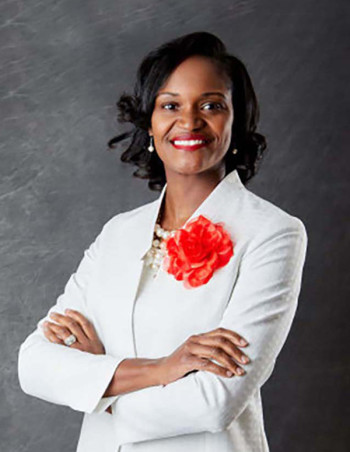Spotlight: Advisor Ka’Neda Bullock’s Master Plan

When speaking with Ka’Neda N. Bullock, CFP®, MBA, AIF®, the founder of Master Plan Investment Group in Pennington, New Jersey, several things are immediately clear: She’s a lifelong learner. She’s an advocate—for herself, her family, and her clients. She’s a woman of faith. And she’s a millennial Black woman in an industry that has struggled with diversity who hasn’t let any of those potential barriers stand in her way.
In honor of Black History Month, we’re excited to shine the spotlight on Ka’Neda, who’s been with Commonwealth since 2014. Her story is an example for anyone who wants to be more compassionate and self-aware in business and in life.
Q: What led you to a career in the financial services industry?
A: I was raised by loving, driven women role models, beginning with my mother. Education was important, but so was being assertive and not being afraid to ask for or create opportunities.

Ka'Neda Bullock, CFP®, MBA, AIF®, with Commonwealth since 2014
As class president at Smith College, I had the privilege of meeting with the board of trustees. One member, Janet McKinley, was a portfolio manager at Capital Group American Funds and told us to reach out if we needed an internship and wanted to learn about finance. I did. And that was the genesis of my learning about the investment management industry.
I had no clue what I was doing at first, but I saw they were supportive of me asking good questions—what was their journey like? how did they get to that place? And so, every year, I said, “Do you mind creating another project for me to come back?” The answer was always yes.
I went on to participate in Capital Group American Funds’ Management Training program. I had a rotation with the investment research team under the SMALLCAP World Fund. I worked on an international fund development project in Switzerland. I learned about advisor marketing in the LA office. At the end of the program, they wanted me to stay on, but I knew I wanted to be an advisor, so I returned home to New Jersey to begin studying for my securities licenses and started working with Edward Jones. I knew the investment piece, but I knew they would teach me how to build a business.
Still, I felt that wasn’t my final home. I wanted to do more financial planning. I wanted to give opportunities to families that didn’t have them, and I wanted to change the conversation. I was passionate about growing a business and teaching others. It was a very straightforward decision to come to Commonwealth after I learned about the firm’s emphasis and flexibility around investment management and financial planning.
Q: You were a Fulbright Scholar. Have you used any of your experiences from that program to guide you in your role as an advisor?
A: I traveled to Korea as a Fulbright Scholar. That experience taught me what it’s like not to fully know a language when everyone else is fluent. Some people don’t realize investing is a different language that most people don’t speak. As I talk with clients, I put myself back there. I think about the hospitality I felt, the emotional connection, the trust. I knew they would act in my best interest, but I had to learn their language.
My clients trust me. They know I’m fluent in the language, and I’m an advocate for them to learn it. And I’m acting in their best interest. There are so many things I felt then that I know my clients feel now, and that continues to guide me.
Q: As a Black woman and a millennial, how have you navigated an industry that has struggled with gender and racial diversity and ageism?
A: I was always comfortable not being in the majority, but I also knew I was smart, I had support, I had faith, and I wasn’t going to be pushed aside because I was a Black woman.
It wasn’t always easy. There were some experiences where I could say, “Oh, I see how they do it; let’s try to do it like that.” But sometimes I didn’t have the memberships or the networks, so I’ve had to do things a little differently. That doesn’t mean I can’t meet and exceed others’ levels of success.
Seeking formal and informal mentors that looked like me, that had investment practices like mine—and, of course, mostly those that didn’t—was primarily how I navigated the industry. When I first joined Jones, there was an older white man, an informal mentor, that let me ask him tons of questions. I knew some things he said wouldn’t work for me, but it still was good advice.
I asked myself often, who are the other top advisors I admire? What are they doing? Where did they go to school, or what designations do they have? I don’t know many Black CFPs and certainly not Black female CFPs. So, they have definitely shaped how I run my practice and the education I’ve pursued.
Q: After joining Commonwealth with another practice, you recently started your own firm, Master Plan Investment Group. What has the transition to business owner been like?
A: I officially started in October 2019, so my firm was in business about five months before the pandemic began. Establishing the firm and setting up my practice took a lot of time, energy, thoughtfulness, and focus to be able to hear from the Lord to guide me.
I didn’t know ownership would be my path—I envisioned partnership—but it was clear I was given the direction. Working with the other firm, I was allowed a lot of freedom, which I’m thankful for. During that time, I was able to get my master’s, have children, begin my CFP—all those milestones for my family. But I had a specific vision, and I knew I would have to go out on my own to accomplish it.
I wanted to have a team of like-minded people that were driven in the same way, for the same types of causes, saw the power of investing, and wanted to share it to help other families and businesses. When I was preparing to transition, I looked at other firms—that’s the due diligence everyone should go through—but what made me stay at Commonwealth was the extensive resources, private ownership, and the flexibility it allows the firm. There’s always been the feeling that leadership is accessible. You know, if I had a question and I called enough times, I would get to the person I wanted to speak with at all levels. That access is important to me.
2020 was challenging because of what was going on in the world. I also had a lot of things to learn about running the business. I relied on the relationships I’ve built to help steer me in the right direction. And the business has grown wonderfully. Client referrals were outstanding last year, and 2021 has already been wildly successful.
My plan is to grow the number of advisors and paraplanners with the firm while retaining our core values. I constantly look at how I can continue to be an advocate for diversity. As a Black woman, I look for others that are interested, driven, and smart, but just don’t know how to get started.
Q: Who is your ideal client? What problems do you help them solve?
A: We serve both personal wealth management clients and corporate retirement plans. With the corporate retirement plans, we also provide financial wellness programming, either in addition to managing the retirement plan or à la carte.
When I think about the profile for those clients—their organizational structures, missions—they’re people that value the importance of financial awareness and stability, and they want to learn more. They value an advisor that’s not only going to set up a great investment strategy, create a sound financial plan, and collaborate, but also educate them.
Some people like an advisor to do everything for them. But I really challenge my clients to be engaged with me, especially my personal wealth management clients. If I work with a married couple, for example, I want both partners to be involved. I’ve actually been praying about a book to write, reminding mothers that their daughter is watching. Don’t forget, this is your money, whether you put it in this investment account or not, and you have to learn about it. You don’t have to be an expert—you can’t take my job!—but I need you to be aware, because if our legacy as women is being uncomfortable with finances but we say, “my husband does that,” that’s what our future will look like, and it shouldn’t.
Q: You’re an advocate for many causes. Can you tell me about some of them?
A: I’m an advocate for women’s rights, of course. As women, we’re often told we can’t do all these things and be great at them. I want to change that conversation and say, yes, you can, but you can’t do it by yourself. My husband, mother, and village are wonderful, stepping in when I have to choose between commitments. Having to push back on culture’s expectations of you as a business owner, wife, and mother can be hard. But the sacrifice is worth it.
My family didn’t have a lot of access to information about wealth growing up, and I want to be able to spread that knowledge. Just because you haven’t learned it doesn’t mean you shouldn’t. You may not have the assets to invest at this time, but inheriting sound knowledge about money management is much more important than inheriting the money—because the money can disappear. But the knowledge lives with you and can be transferred to future generations. And that’s the power I advocate for.
I actively work to increase youth and adult financial literacy and generational wealth by speaking at community seminars and events. One specific organization I support in this area is Cool Kids, which teaches financial literacy and investing to children ages 8 to 16. It’s a free four-week course, and at the end of it, the children get a $20 stock card for one of the online trading platforms. I support the cause financially and by being a finance expert on the weekly calls. Most of the participants are children of color, and it’s great to be able to show them people who look like them are achieving professionals in the industry.
Q: As a mom to two young girls, and given the heightened racial unrest in our society, how do you talk to them about race?
A: My oldest daughter is in kindergarten, and with limited diversity in certain media platforms and her predominantly white school, at times we struggle with making sure she loves her hair and her skin. She often has her hair braided with beads. One day, she came to me and said, “Oh, Mom, my beads are so noisy.” And I said, “Who said that to you? They’re not noisy. They make music as you walk.”
[My 5-year-old] often has her hair braided with beads. One day, she came to me and said, ‘Oh, Mom, my beads are so noisy.’ And I said, ‘Who said that to you? They’re not noisy. They make music as you walk.’
You have to be creative, so you’re not putting pressure on them to take on someone else’s issue but helping them rejoice in their beauty and love themselves. It’s not easy. We work on helping them feel proud of themselves and their history, making sure they understand it doesn’t begin with slavery, which is often taught in this country.
When we draw, we make sure we use all of our colors, and when we bring books to school to be read, they’re books that celebrate diversity. We say our affirmations every day on the way to school. We also talk about culture—that everyone’s from somewhere different—so we do research to learn what those countries are like. These are the things we feel are important and appropriate for their age, 5 and 4.
Q: As we celebrate Black History Month and shine a light on the brave leaders who played such pivotal roles in our nation’s history, what message would you like to leave with our readers?
A: Black history is American history, but so is Irish history or Italian history. We’ve all made great contributions to this country. Unfortunately, certain groups have been marginalized and cast aside for unequal economic advancement. If I can easily get to the top, that means someone must be on the bottom.
That’s not fair and limits the full potential of our industry, community, and nation. There are a lot of people, Black and not, who are committed to changing that. If we’re just open to showing compassion to people who don’t look like us, then we’ll feel like we’re invested in their success, too. And we’ll be able to mentor them without thinking twice about it. This is a great conversation that should be continued throughout the year. We shouldn’t just be comfortable with it—we talked about it; we featured them on our website—but what are we all actively doing to move the needle?
A lot of people know me when I call Commonwealth’s Service Center because of my name; it’s different, and I’m okay with that. They remember me and work with me to address my needs. We’re all in this together, and we all want the best for our clients, and we all want to be successful. We’re in a for-profit business, but that doesn’t mean we can’t recognize, address, and correct inequalities while still having high expectations.
I always strive for excellence—not perfection; nothing’s perfect—knowing I did my best and will continue to grow. Some days are harder than others. But we’re doing this not only for ourselves but for the generations to come, so make sure you love what you do when you wake up every day and stay committed to results.
Stay tuned for more stories of powerful women advisors at Commonwealth in the coming weeks.
Topics
Published
02.25.21
Share
This material is for educational purposes only and is not intended to provide specific advice.
Please review our Terms of Use.


